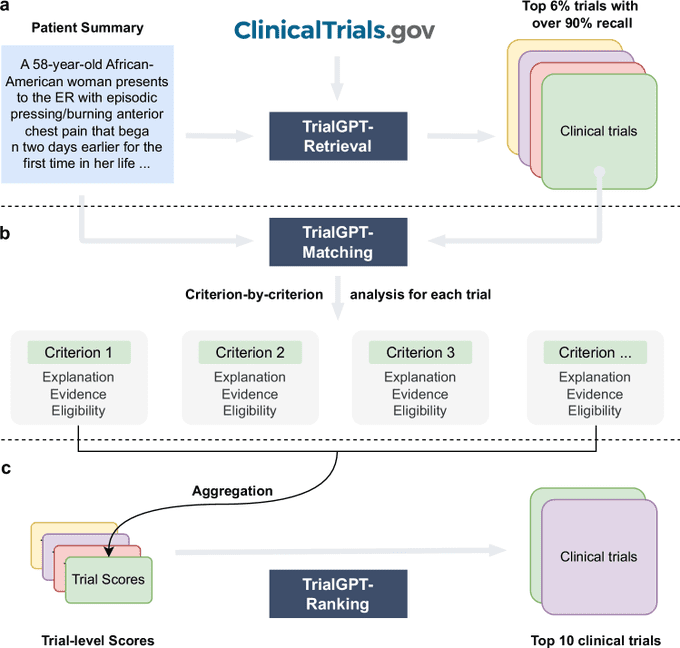Introduction
The landscape of clinical trials is undergoing a significant transformation with the introduction of ‘TrialGPT,’ a specialized version of ChatGPT designed to streamline the clinical trial process. According to a recent tweet by @Nature, TrialGPT operates through three critical steps: TrialGPT-Retrieval, TrialGPT-Matching, and TrialGPT-Ranking. This innovative AI system has demonstrated remarkable efficiency, identifying 90% of suitable trials and saving 42% of the time required to match a patient to a trial.
Steps Involved
TrialGPT-Retrieval
The first step, TrialGPT-Retrieval, focuses on identifying relevant clinical trials from a vast database. This step ensures that the most suitable trials are considered, significantly reducing the time and effort required for manual searches. The retrieval process has been highly effective, identifying 90% of suitable trials, which is a substantial improvement over traditional methods.
TrialGPT-Matching
The second step, TrialGPT-Matching, involves aligning patient profiles with the identified trials. This step is crucial for ensuring that patients are matched with trials that best suit their medical needs and conditions. The AI-driven matching process has resulted in a 42% time-saving, making it a game-changer in the clinical trial industry.
TrialGPT-Ranking
The final step, TrialGPT-Ranking, prioritizes the trials based on various factors such as relevance, patient suitability, and trial success rates. This ranking system helps in making informed decisions, ensuring that the most promising trials are given priority.
Impact on the Healthcare Industry
The introduction of TrialGPT will revolutionize the healthcare industry, particularly in the realm of clinical trials. By leveraging AI and machine learning, TrialGPT enhances the efficiency and accuracy of the trial matching process, ultimately leading to better patient outcomes and faster drug development cycles.
Challenges and Considerations
While it offers numerous benefits, it is essential to address potential challenges and ethical considerations. The use of AI in healthcare raises questions about data privacy, algorithmic bias, and the need for regulatory oversight. Ensuring that it operates within ethical boundaries and complies with healthcare regulations is crucial for its long-term success.
Future Prospects
The future looks promising, with potential applications extending beyond clinical trials. As AI technology continues to evolve, we can expect further advancements in personalized medicine, predictive analytics, and patient care. The integration of AI in healthcare is not just a trend but a necessity for achieving better health outcomes and improving the overall efficiency of medical processes.
Related Articles
- ChatGPT Cheat Sheet for Job Seekers
- Beyond ChatGPT: 7 AI Tools to Enhance Your Productivity
- SearchGPT vs ChatGPT: Differences, Benefits, and Future
- ChatGPT: All That You Need to Know
- ChatGPT Prompt Frameworks: Enhancing Conversations with AI
Looking for Travel Inspiration?
Explore Textify’s AI membership
Need a Chart? Explore the world’s largest Charts database
